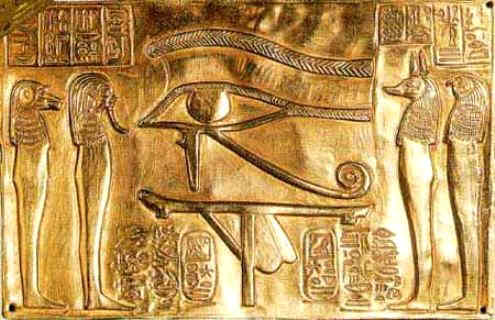Horus in Egyptian Mythology
Horus, the Egyptian solar god, the protector of the monarch and the vanquisher featured in the stories, myths and legends in Egyptian Mythology, in particular with the myth surrounding Osiris. In the creation myth of the gods of the Ennead of Heliopolis Horus was the son of Isis and Osiris, the mythical king and queen who ruled Egypt. Set, the brother of Osiris and Isis, murdered Osiris and usurped the throne of Egypt. Isis impregnated herself from the corpse of her husband and subsequently gave birth to Horus in secrecy at Khemmis in the Nile delta. She hid the child from Set in the papyrus swamps. When Horus became older he battled with the evil Set and vanquished him, then took his rightful place as the ruler of Egypt and the kingdoms of both Upper and Lower Egypt were united. During their battle, which lasted for eighty years, Set had torn out the left eye of Horus (the moon) which he was forced to return it by a council of the gods. Horus the Uniter
The victory of Horus over the evil Set resulted in the unification of Upper and Lower Egypt. The Egyptian pharaoh was believed to be an incarnation of the god and formed part of his name. The pharaoh was said to become Horus after death. His role in the unification of Upper and Lower Egypt is clearly indicated by the Pshent double crown he wears. The Sons of Horus
He was closely connected with the Underworld and performed duties of a friendly nature for the dead. The Sons of Horus whose names were Imsety, Hapy, Duamutef and Qebehsenuef also performed funerary duties in respect of mummification. They were the guardians of the special containers, called canopic jars, that held the liver, lungs, stomach and intestines were placed in special containers called canopic jars. Qebehsenuef was depicted as a mummified man with the head of a hawk who protected the intestines. Hapy was depicted as a mummified man with the head of a baboon and protected the lungs. Duamutef was depicted as a mummified man with the head of a jackal and protected the stomach. Imsety was depicted as the mummified man-headed god who protected the liver. Manifestations of Horus
In the passing of time ancient Egyptian myths emerged detailing different manifestations of Horus referring to his birth and secret rearing by Isis, his battle against Set, his position at Heliopolis, associated with the rising sun, and linked with Ra, the Supreme Solar God in the sun cult. Others referred to avenging his father's murder, as symbol of resurrection, linked with the setting sun and his role in uniting Upper and Lower Egypt. Reference to Horus in the Coffin Texts
The Coffin Texts are a collection of ancient Egyptian funerary spells written on coffins beginning in the First Intermediate Period which were partly derived from the earlier pyramid texts. A combination of the Pyramid texts and the Coffin texts eventually formed the famous Book of the Dead. A passage from the Coffin Texts (passage 148) describes Horus in his own words: "I am Horus, the great Falcon upon the ramparts of the house of him of the hidden name. My flight has reached the horizon. I have passed by the gods of Nut. I have gone further than the gods of old. Even the most ancient bird
could not equal my very first flight. I have removed my place beyond the powers of Set,
the foe of my father Osiris. No other god could do what I have done.
I have brought the ways of eternity to the twilight of the morning. I am unique in my flight.
My wrath will be turned against the enemy of my father Osiris
and I will put him beneath my feet in my name of 'Red Cloak'." The 'Eye of Horus'
The "Eye of Horus" was one of the most important Egyptian Symbols symbolizing of royal power, protection and good health. It is depicted as a human eye and symbolically with the long tail and brows which are the markings of a hawk. It was a fetish that was believed to embody magical powers and offer magical protection. It also had the power to heal the living and protect the dead. 
|